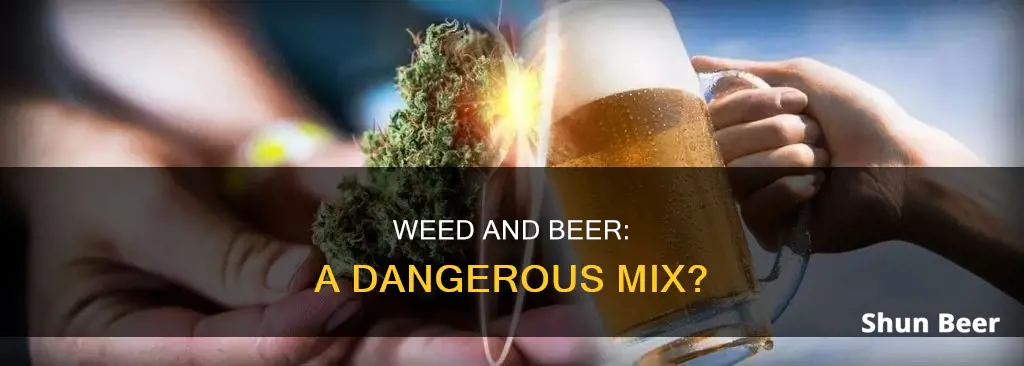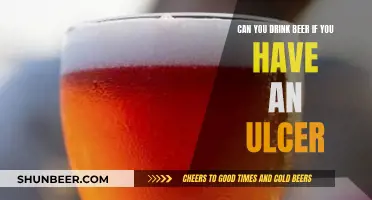
Alcohol and weed are two of the most commonly used substances worldwide. While both can be consumed safely and legally in certain places, they can also be dangerous and deadly when abused or mixed together. The effects of both substances are similar, including drowsiness, slowed reflexes, and changes in judgment and time perception. Mixing the two can lead to a range of adverse reactions, including dizziness, sweating, nausea, vomiting, and anxiety.
The combination of alcohol and weed can also lead to risky behaviours, such as drunk driving, unprotected sex, and increased likelihood of accidents and injuries. Additionally, alcohol is a known carcinogen linked to several types of cancer, while weed has been linked to an increased risk of psychiatric diseases, such as psychosis and schizophrenia.
While the long-term effects of weed are less clear due to a lack of research, alcohol's potential health risks are well-documented. Alcohol use was the leading health risk factor for people aged 15-49 globally in 2016, contributing to 3.8% of female deaths and 12.2% of male deaths. In contrast, no deaths from marijuana overdoses have been reported.
| Characteristics | Values |
|---|---|
| Short-term effects | Distorted perception of time, impaired cognitive ability, impaired movement, increased heart rate, inability to make important decisions, short-term memory loss, increased likelihood of accidents and injury, increased risk of sexual assault or violent attack, increased risk of STDs, infections and unwanted pregnancies, increased likelihood of hallucinations, paranoia, overdose and respiratory depression, anxiety, nausea, vomiting, panic, and psychosis |
| Long-term effects | Tolerance to both cannabis and alcohol, dependence on both cannabis and alcohol, addiction to both cannabis and alcohol, damage to the brain and organs, serious mental health illnesses including anxiety, depression and psychosis, increased risk of developing several types of cancer, short-term and long-term memory loss |
| Addictiveness | Alcohol is more addictive than weed. Alcohol use disorder is a relatively common issue, with 15 million people in the US dealing with it. Cannabis addiction is also possible, with around 30% of weed users developing some degree of "marijuana use disorder". |
| Driving | Combining weed and alcohol consistently impairs driving performance. |
| Mixing the two | Weed and alcohol are two of the most commonly used substances in the US. Mixing them can lead to a "green out" or "cross-fade", which can be an uncomfortable and dangerous experience. |
What You'll Learn
- Mixing alcohol and weed can lead to a loss of control, overdose, and respiratory depression
- Alcohol increases the absorption of weed's main psychoactive ingredient, delta-9-tetrahydrocannabinol (THC), intensifying its effects
- Short-term effects of both substances include distorted senses, impaired cognitive ability, and increased heart rate
- Long-term effects of mixing alcohol and weed may include brain and organ damage, mental health issues, and an increased risk of several types of cancer
- Mixing alcohol and weed can lead to unusual or risky behaviours, including unprotected sex and drunk driving

Mixing alcohol and weed can lead to a loss of control, overdose, and respiratory depression
Mixing alcohol and weed can have a variety of adverse effects on the body and mind. One of the most significant risks is the loss of control over one's actions due to the exaggerated effects of both substances. Alcohol increases the absorption of THC, the main psychoactive ingredient in weed, leading to a stronger high and intensified effects. This can result in a person losing control of their actions, as their senses become distorted, and their ability to process information is impaired.
Another consequence of mixing alcohol and weed is the increased risk of overdose. As alcohol and weed have similar effects on the body, including drowsiness, slowed reflexes, and altered judgment, combining them can lead to an excessive and dangerous enhancement of these effects. This can result in respiratory depression, a potentially life-threatening condition where breathing slows or stops.
The combination of alcohol and weed can also lead to a loss of coordination and fine motor skills, increased heart rate, impaired cognitive ability, and short-term memory loss. It is important to note that the order of consumption also plays a role, as drinking alcohol before smoking weed can further enhance the effects of THC. Additionally, the delayed onset of edibles may lead to overconsumption, resulting in a longer and more intense high.
The risks associated with mixing alcohol and weed are heightened for those with a history of mental health issues or a family history of addiction. Combining these substances can increase the likelihood of developing a serious mental health illness, such as anxiety, depression, or psychosis. Furthermore, the negative impact on mental health may not be immediately apparent, as symptoms may persist or even emerge long after stopping the use of alcohol and weed.
Beer Without Getting Buzzed: Is It Possible?
You may want to see also

Alcohol increases the absorption of weed's main psychoactive ingredient, delta-9-tetrahydrocannabinol (THC), intensifying its effects
Alcohol and weed are two of the most commonly used substances worldwide. While the effects of consuming one of these substances can be dangerous, the combination of the two can be even more harmful. One of the main reasons for this is that alcohol increases the absorption of delta-9-tetrahydrocannabinol (THC), the main psychoactive ingredient in weed, thus intensifying its effects.
When alcohol is consumed before weed, it can lead to a stronger high. This may be desirable for some, but for those with low tolerance to weed or those who are inexperienced with it, it can result in a "green out". A green out refers to a range of unpleasant physical symptoms, including dizziness, sweating, nausea, and vomiting. It can also cause increased anxiety, panic, and paranoia due to the heightened THC absorption.
The increased absorption of THC when alcohol is consumed prior to weed has been supported by research. A 2015 study found that participants who consumed alcohol before inhaling THC had significantly higher peak THC levels than those who had a placebo. However, it is important to note that this study had a small sample size, and more research is needed to draw definitive conclusions.
The combination of alcohol and weed can also distort an individual's senses, such as sight, hearing, smell, touch, and taste. The prefrontal cortex, responsible for processing sensory information, is affected by the effects of both substances, leading to thoughts based on distorted information.
In addition to the intensified effects of THC, drinking alcohol and smoking weed together can have other consequences. Research suggests that individuals who use both substances together tend to consume more of each, increasing the risk of developing a dependence on one or both. This higher intake can also lead to a decline in cognitive function and structural changes in the brain.
Furthermore, the combination of alcohol and weed impairs driving performance. A 2013 study found that adding alcohol to both low and high doses of THC impaired driving simulator scores. Thus, it is crucial to refrain from driving after consuming either substance, let alone both.
While occasional mixing of alcohol and weed may not lead to major health problems, it is important to proceed with caution. The effects can vary greatly from person to person, and it is essential to monitor your consumption and listen to your body.
Drinking Beer While on Probation: What You Need to Know
You may want to see also

Short-term effects of both substances include distorted senses, impaired cognitive ability, and increased heart rate
Alcohol and weed are among the most commonly used substances. While mixing the two may not lead to major health problems, it can cause a range of adverse short-term effects, including distorted senses, impaired cognitive ability, and increased heart rate.
Distorted Senses
Weed and alcohol can distort the way we perceive our surroundings, including our sense of sight, hearing, smell, touch, and taste. The prefrontal cortex, which is responsible for processing sensory information, is affected by both substances, leading to thoughts based on distorted information.
Impaired Cognitive Ability
The combination of alcohol and weed can impair cognitive functions, such as attention, memory, and decision-making. This can result in an increased risk of accidents, impaired driving performance, and difficulty in making important decisions.
Increased Heart Rate
The use of alcohol and weed together can lead to an increased heart rate. Additionally, both substances can cause dehydration, further exacerbating the impact on the cardiovascular system.
It is important to note that the effects of mixing alcohol and weed can vary from person to person, and the order of consumption can also play a role in the overall impact. While occasional mixing may not lead to major health issues, regular and frequent use of both substances together can have more pronounced and long-term negative consequences.
Golf and Beer: A Match Made in Heaven?
You may want to see also

Long-term effects of mixing alcohol and weed may include brain and organ damage, mental health issues, and an increased risk of several types of cancer
Mixing alcohol and weed can have long-term effects on the body and brain. Both substances are depressants, which means they slow down brain activity. When combined, alcohol and weed can cause more prominent structural changes in the brain, particularly in the hippocampus. This can lead to long-term damage, including:
- Brain development issues: While the research is not conclusive, there is evidence that consuming weed as a teenager can lead to brain development issues later in life.
- Mental health issues: Regular and heavy use of alcohol is associated with poor mental health, including psychological distress and low life satisfaction. Mixing alcohol and weed can increase the risk of depression, anxiety, and other serious mental health illnesses.
- Organ damage: Excessive alcohol consumption can cause liver disease and damage to the pancreas and cardiovascular system. Mixing alcohol and weed can further increase the risk of organ damage.
- Increased risk of cancer: Long-term alcohol use is associated with an increased risk of several types of cancer. Mixing alcohol and weed may further elevate this risk.
Beer and Standard Drinks: What's the Count?
You may want to see also

Mixing alcohol and weed can lead to unusual or risky behaviours, including unprotected sex and drunk driving
Mixing alcohol and weed can have a significant impact on a person's decision-making abilities, which can lead to unusual or risky behaviours. One of the most prominent risks is the increased likelihood of engaging in unprotected sex. This is due to the combined effects of alcohol and weed on a person's judgment and inhibitions. Alcohol is known to reduce inhibitions and impair judgment, while weed can distort a person's senses and perception of time. When combined, these effects can lead to poor decision-making and an increased likelihood of engaging in risky sexual behaviours.
Another critical risk associated with mixing alcohol and weed is drunk driving. The impairing effects of both substances on cognitive function and reaction time can significantly increase the danger of operating a vehicle. Studies have found that combining even low doses of alcohol and weed can impair driving performance, with worse performance during nighttime simulations. The delayed onset of the high from weed, particularly when consumed as edibles, can also make it challenging for individuals to gauge their level of intoxication accurately. This may lead them to mistakenly believe they are fit to drive when, in reality, they are well over the legal limit.
The combination of alcohol and weed can also increase the likelihood of other risky behaviours. For example, a study found that individuals who used both substances simultaneously were more likely to experience social consequences and self-harm. The altered state of mind induced by the combination of alcohol and weed can impair an individual's ability to make important decisions and increase the risk of accidents and injuries.
It is important to note that the effects of mixing alcohol and weed can vary from person to person, and not everyone will experience the same intensity of effects. However, due to the potential risks and unpredictable nature of the combination, it is generally recommended to avoid mixing the two substances.
Drinking Beer in Rome: What You Need to Know
You may want to see also
Frequently asked questions
Short-term effects of mixing alcohol and weed include distorted perception of time, impaired cognitive ability, impaired movement, increased heart rate, short-term memory loss, and increased likelihood of accidents, injury, and overdose.
Long-term effects of mixing alcohol and weed include tolerance, dependence, and addiction to both substances, damage to the brain and organs, serious mental health illnesses, and an increased risk of developing several types of cancer.
Drinking alcohol before smoking weed can intensify the effects of weed, leading to a stronger high. This is because alcohol increases the absorption of weed's main psychoactive ingredient, delta-9-tetrahydrocannabinol (THC).







